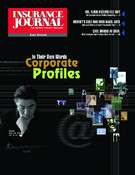Few professionals understand more than insurance agents how unprepared Americans can be for life’s dangers. A new survey confirms agents’ fears about their own customers. It shows ours to be a nation of citizens who while worried about illness, accidents, old age and death, do not do much to prepare for what they fear.
A substantial majority, 79 percent, agree that Americans have become generally more anxious, yet only 16 percent feel up to contemplating the costs of old age and illness; 48 percent prefer not to think about the costs associated with illness and death, and 41 percent say that, at this point in their lives, they don’t have money for insurance.
In early May 2005, the JWT communications (www.jwt.com) agency conducted an online survey, netting a total of 2,568 respondents from all states. The survey shows many Americans don’t have basic insurance coverages. Only 53 percent have homeowners insurance, for instance, and only 12 percent have renters insurance. While the youngest, those aged 18-29, are predictably the least insured-just 42 percent have home or renters insurance-even older Americans shirk their dwelling insurance responsibilities.
Even fewer are prepared for other contingencies: 33 percent have no critical-illness coverage; 46 percent are short on disability income protection; 32 percent are vulnerable on personal liability, and on and on.
Marian Salzman, executive vice president at JWT, thinks the survey results mirror the times. “This is a delicate time in which two big trends are coming together. Americans have become highly sensitized to risk and death since 9/11, yet at the same time they’ve become used to getting their feel-good gratification quickly. Get-it-now-pay-later credit, broadband, wireless connectivity, and everything-on-demand have made everything quicker and have narrowed the gap between wanting and getting. We expect to get our paybacks fast. The problem with insurance is that it just doesn’t fit into this emotional environment. For many people, the essential pay-now-get-it-later nature of insurance is too abstract, too far off, and does very little to reduce their feelings of anxiety in the here and now. In fact, the prospect of having to pay for the insurance now may well add to the anxiety, which is a big disincentive.”
According to Salzman, the findings present both challenges and opportunities for the insurance industry. The opportunities obviously lie in the fact that so many Americans are feeling anxious and too many are underinsured.
The challenges, however, are not so simple. “Insurance industry products are abstract and complicated, whereas most Americans want simple and easy. Insurance products are competing for consumer dollars against great swathes of more tangible products offering much greater feel-good benefits. Americans have long-term anxieties the insurance industry can help to address, provided the industry can figure out how to connect with people on today’s terms,” Salzman concludes.
Maybe that’s why some banks still give away toasters. Insurance marketing often seems abstract like the products. It’s not easy selling a serious product in today’s society.
Topics Market
Was this article valuable?
Here are more articles you may enjoy.


 The $3 Trillion AI Data Center Build-Out Becomes All-Consuming for Debt Markets
The $3 Trillion AI Data Center Build-Out Becomes All-Consuming for Debt Markets  Florida’s Commercial Clearinghouse Bill Stirring Up Concerns for Brokers, Regulators
Florida’s Commercial Clearinghouse Bill Stirring Up Concerns for Brokers, Regulators  Lawyer for Prominent Texas Law Firm Among Victims ID’d in Maine Plane Crash
Lawyer for Prominent Texas Law Firm Among Victims ID’d in Maine Plane Crash  Zurich Insurance’s Beazley Bid Sets the Stage for More Insurance Deals
Zurich Insurance’s Beazley Bid Sets the Stage for More Insurance Deals 


